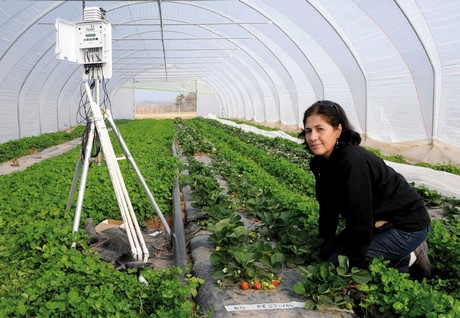
The conditions for soft fruit production in Mexico are ideal: 1,500 metres above sea level, an average of 800-1200 mm of rainfall and temperatures between 16-25 degrees Celsius. The production area has increased from 9,000 hectares in 2004 to more than 22,000 hectares in 2012. The same applies to production volumes, from 207,000 tonnes in 2004 to more than 524,000 tonnes in 2012. The production of blackberries, blueberries and raspberries over the past 12 years has grown at an annual average of 22 %. Mexico is estimated to be the world's sixth largest berry producer and the second largest exporter. Strawberries are also on the rise. From 2011 to 2012, production volumes increased by 57%, turning Mexico into the world's fifth largest producer and the third largest exporter. This increase is not only due to the ideal climatic conditions, as the use of natural cultivation methods also plays a role. The fruit is grown in greenhouses made of micro-tunnels. In this way, a year-round production is possible, which is important for large customers, such as the United States.
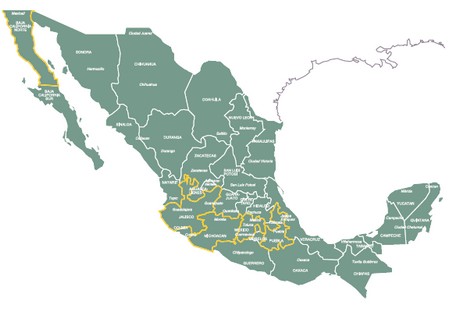
The main regions (yellow) where soft fruit is cultivated, are the states of Michoacán, Jalisco and Baja California.
• Blackberries: Michoacán, Jalisco and Colima (over 11,000 hectares).
• Strawberries: Michoacán, Baja California and Guanajuato (over 8000 hectares).
• Raspberries: Jalisco, Michoacán and Baja California (over 1000 hectares).
• Blueberries: Jalisco, Puebla and Mexico State (over 880 hectares).
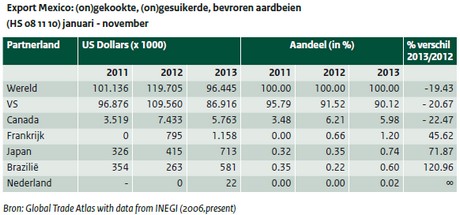
The GAIN report "Mexico: Berry Sector's Growth has Important Consequences for the Campo" of the U.S. Department of Agriculture (March 2013) points out that the share of protected agriculture in the production of raspberries amounts to 90%, whereas for strawberries and blueberries the share is only 50%. Meanwhile, blackberries have been deemed the most labour-intensive fruit.
Mexico has worked hard to diversify its markets, with the processing industry playing also a very important role. The fruit is frozen and dehydrated, and juices and jams are manufactured. This broadening of the product range generates value to consumers, as well as a higher income for producers and processors.
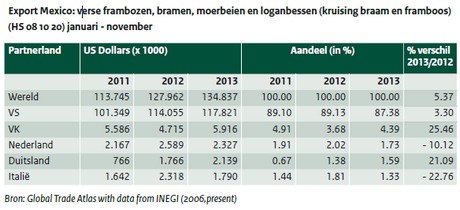
Trade
In the period between January and November 2013, Mexico exported more than $96 million worth of strawberries to (mainly) the United States. This market concentration is slowly shifting to other countries such as Canada, France and Japan (among others). The export of strawberries is also expected to increase before long in other Asian and European markets. As regards blackberries and raspberries, Mexico has succeeded better in diversifying its exports. Besides the United States, the fruit is also shipped to the UK, the Netherlands and Germany.
In recent years, blueberries and cranberries have been doing well in the Asian market, especially in Japan and Hong Kong, but also in Europe and especially the UK. Dutch demand for this fruit is also on the rise. Remarkably, the export figures for these two fruits (judging by the tables) are very similar to those of raspberries and blackberries.
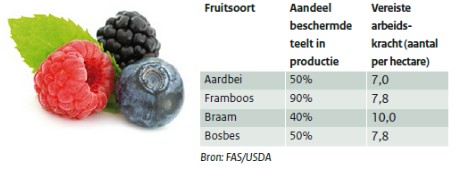
The improvements in production capacity and quality and the active participation of producers in European markets, such as Fruit Logistica in Germany and the PMA trade show in Atlanta, have definitely made a significant contribution to the sector's diversification. Another trend that can be detected is the growing focus on healthy eating. Raspberries and blackberries have a good image and are perceived by consumers as healthy food that is advisable to consume. These fruits are perfect for breakfasts, salads and other (main) dishes. The Mexican government encourages fruit producers not only to participate in international fairs and exhibitions, but also to obtain international certifications to achieve a better position in the worldwide market. At the same time, some producers join forces in logistics and other areas with the goal of reducing costs. These efforts are important for the development of the market at a national and international level.
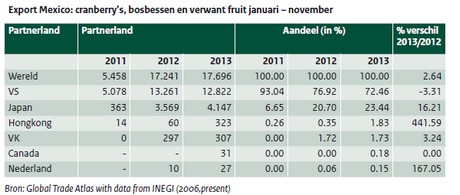
Cooperation
Cooperation is the key word for Mexican fruit producers, as it is the only way to gain market share. The trade association Aneberries AC (www.aneberries.mx) is the driving force behind this success. The association was founded in June 2010 and is based in Jalisco. Its 17 members produce and export all kinds of berries. Aneberries aims to represent its members at national and international level and strives to promote improvements in the areas of sustainability, food quality and safety, but also in the field of business management and cooperation with the Mexican government.
Efficient organisation, investing, quality products and international visibility are the basic elements for success in this sector. The Mexican government is willing to provide assistance in the internationalisation process with product promotion, both locally and internationally, which has helped improve the sector's competitiveness.
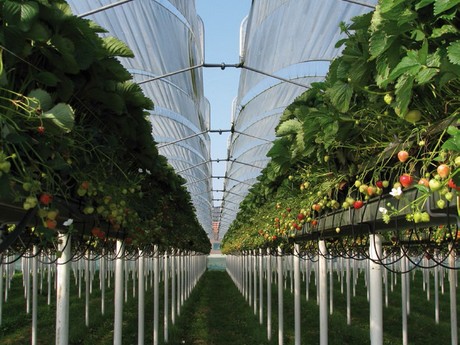
Opportunities for the Netherlands in the Mexican soft fruit sector are mostly in the field of knowledge sharing regarding new species and new ways of growing, producing and processing. Through Aneberries, Dutch entrepreneurs may enter into partnerships with producers in various fields, especially in hydroponics and greenhouse production, in which the Netherlands is specialised. Companies and organisations interested in establishing contact with producers or processors in the sector may get in touch with the Mexican Department of Agriculture via mex-lnv@minbuza.nl.





